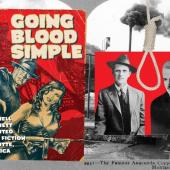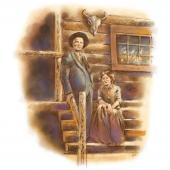James Grady on Condor, His Home State of Montana, and His New Book

By most any standard of measure, James Grady has led a charmed life, and one of the most attractive things about him is that he is not only completely aware of this fact, but he still delights in it fifty years after everything turned for him.
When Grady was fresh out of college, he got a chance to work for Senator Lee Metcalf in Washington, and he used to walk by a small government building every day. "There never seemed to be anyone coming out or going into this building, so it made me wonder whether it was a CIA office, or maybe FBI."
Grady would sometimes go out to grab sandwiches for his fellow employees for lunch. And one day it occurred to him how odd it would be for a low-level CIA employee go out to buy lunch for everyone, only to return to find all of his fellow employees dead.
When he returned to Montana, Grady had access to a typewriter through another job, and he began work on a novel based on these two basic ideas. The result was a thriller called Six Days of the Condor. But Grady knew nobody in the publishing business, so he decided to look through The Writer's Market for publishers that published similar books, and began sending the novel out. After getting a rejection letter from the first publisher, Grady sent the manuscript to W. W. Norton, and several months later, he got a call one day from a man named Starling Lawrence, telling him that Norton wanted to publish Six Days of the Condor, and give him a one-thousand-dollar advance.

Grady was so over the moon that when the editor also mentioned something about a possible movie deal, Grady just assumed the guy said that to all new authors, and didn't take it seriously. So when he got another call from Mr. Lawrence a few months later, telling him that they had sold the movie rights, and that Grady's take from the deal was over $80,000, Grady went silent for a time before Starling Lawrence asked him if he was okay.
"I'm fine, sir, it's just that I haven't heard a word you said since you said $80,000."
Over the course of the next year, Grady found himself in some pretty heady company when Sidney Pollack, who later earned two Oscars for Out of Africa, signed on to direct the film, and they landed Robert Redford, fresh off a run including The Sting, The Great Gatsby, and The Way We Were — and just about to film All the President's Men. Faye Dunaway was signed as his costar, not too long after completing Chinatown, and the legendary Swedish actor Max von Sydow was recruited to play the chief villain.
This success led to a string of books based on the same character, although Grady is superstitious about keeping track of how many. And for many years, he was content with this career trajectory. But in 2019, Grady paid a visit to his hometown of Shelby, something he does annually, and took a walk in the local cemetery. Standing in that cemetery on a beautiful, quiet day in July, Grady says, "I swear to God, this has never happened to me before. I felt like I was simultaneously hit by a lightning bolt and pulled up in some kind of sucking wind. And I actually heard a voice say, 'All the old ghosts are leaving town.'"
Whether you believe in such things or not, there's no denying when you hear Grady tell this story that something happened, and it had a profound effect. "I sort of came to parked in my rental car on Main Street, and I realized I owed it to the people we come from, and to heartland America, especially small-town Montana, to write about our reality."

Grady was so inspired by this experience that he has produced a trilogy that is highly autobiographical but because it's fiction, also allowed him to explore a wider range of subject matter. The first novel, The Smoke in Our Eyes, came out in 2024, and the publisher made a bold decision to release the other two novels, Something's Happenin' Here and Tramps Like Us, in a single volume, called American Sky, which will be released in July.
"I wanted to capture the reality of what happened here, in a way that Montanans now — whether or not they grew up in it, or whether they came here — that they get a picture of where this great state came from."
The storyline for these three novels opens in 1959, when the main character, Lucas Ross, is ten, in fifth grade.
Grady says that he probably couldn't have written these books ten years ago. "It might sound strange coming from a senior citizen [Grady is now 75], but I think it took a long time for me to get the space, and I don't want to say I needed it for perspective, but I needed that space in order to tell the story honestly.
"I had about a dozen people from the Shelby vicinity help me with their stories. And then a couple from Cutbank and a couple from Conrad. But because it was fiction, it allowed me to tell the truth because I didn't need two sources and a document to verify that my friend was discriminated against after surviving polio. I had her testimony."
Grady received a lot of pushback from the publisher for trying to step out of his comfort zone. "Oh no, you can just give us another thriller and we can show it to Hollywood, and yadda yadda…" and Grady's response was, "Yeah, later. Right now what's important is telling the truth about America growing up after World War II, in the generation that was barely in high school when JFK got assassinated."
Grady also wanted to capture another aspect of small-town Montana that most people might not think about. "When I was growing up, some of the people who founded the towns around us were still alive! So we didn't really start to get a class system in Shelby until I was about fourteen or fifteen. My mom used to say, 'We all know who doesn't have a Sears catalogue for the outhouse, so don't go tryin' any highhattin' on us."
Grady also does a deep dive into how isolated life was in Montana at the time, and how that impacted peoples' view of themselves and of the rest of the world. There are Native characters in the book, particularly Marin, one of Lucas Ross's best friends, and Grady wanted to show how disturbing the racist attitudes were during that period.
"It was a shock to me that [the real life] Marin and some of his other friends had to deal with. When I saw the racism that came their way, I felt like a pool ball that had been knocked onto another table or something. It was stunning to me."
The impact of this kind of isolation is also conveyed by the main source of information for the characters in these books.
"Until I was about twelve, most of the homes in our town didn't have TVs. So before that, we really didn't have a sense of the outside world except through radio and books, and then finally the movies, which was why my job working in the projector room for the movie theater my father managed became such an important part of my upbringing. Sometimes I got to see five or six new movies a week!

"So those movies, and books, gave me the idea that there was an outside world out there that I wanted to know more about, even as I was watching the mysteries around me unfold. Watching both tragedies and victories happen. So in the first novel, there's a scene, and I'm going to try not to cry when I tell you about this. In the late 1970s, a farmer died in mid-August, and it was right about the time the crops were about to come in. And you know that when it gets to that point, you have maybe two weeks to get those crops harvested. So one morning… this is hard…. about fifty combines, followed by trucks…the widow came running out, wondering what the hell was going on. All the farmers risked their own crops to save this widow's crops. So you'd see stuff like that.
"So I want to make sure people around the country, and even in Europe, see this side of America. We hear all this talk about making America like it used to be. Well…I'd like to see America like it should be."
Grady was so motivated by the experience in that cemetery that he cranked out three fairly substantial, and very personal, novels in five years, which is not easy.
"So there's a moment, as you know, when the characters stand up and say 'No, I'm not five foot three and my name is not Joe.' So that came fairly quickly, plus a lot of the people that I was checking in with to make sure I was getting it right kept telling me to hurry up and start writing this thing, and once I started, it flowed like a river. In fact, I thought it would just be one book, but it soon became clear that I needed to break this into three parts, to explore the three different periods of this kid's life, as well as America's past.
"So the first novel, The Smoke in Our Eyes, starts with the day the music died… the Buddy Holly plane crash, and it was also the end of the Eisenhower era, and it was the first year that we had official Killed in Action soldiers in Vietnam. Lucas is ten, so he's still a kid. He's still a child, even. But he's starting to hear and feel things that he didn't the first nine years of his life."
"The second novel… the first half of the American Sky volume, Something's Happening Here, and of course that's from the song by that amazing band, Buffalo Springfield. I remember seeing them play that song on TV when I was in high school, and thinking these guys are on to something, So I used that title as an indication that Lucas is starting to think about what's happening in the rest of the world, and I start that book with the Kennedy assassination. But there was so much going on then. We started to get news of kids we knew dying in Vietnam. But there were also funny things, because teenagers do stupid things."
One of my favorite scenes from that novel is when Lucas, who is not Catholic, goes to confession to tell the priest that if this young woman happens to come in and confess to having one of the local boys try and feel her breasts, it was his fault. Lucas doesn't want the girl to get in trouble for his actions. "Let's just say that might have been a true story," Grady says.
The third novel is called Tramps Like Us, from the Springsteen song "Born to Run," and "it's meant to represent that last year when we can claim to not grow up. It's truly a blue-collar saga. I was so lucky to be hired on to the Shelby City road crew. I learned so much in those four years. I damn near died every summer from various accidents. I learned at a different pace than I did at the university. Different kinds of learning. But I was also no longer Tom Grady's kid. I was Jim Grady, and I was expected to do my part. I felt like I mattered, and if there's one thing I wanted to get across in these books, it's that the people who live in these small towns in Montana matter. I want these stories to indicate that these people matter."
As someone who has read these books, I can say that James Grady has achieved that objective. The storytelling is compelling and fast-paced, the characters lovable but flawed, and the depiction of small-town Montana is spot on. Do yourself a favor and buy all three.













Leave a Comment Here